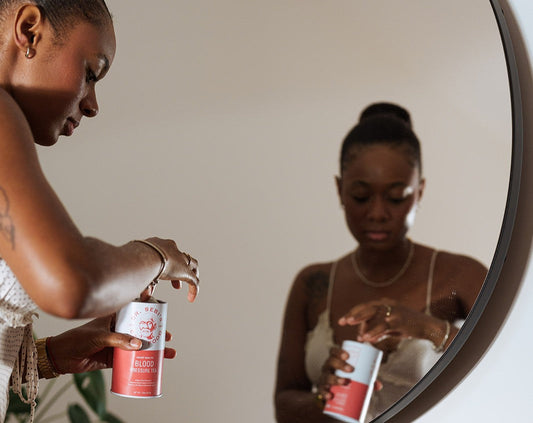Winter often brings with it cozy sweaters, warm drinks, and the magic of snowfall. But along with the charm of the season a unique set of challenges and opportunities for maintaining your well-being. Chief among these concerns is the dreaded cold and flu season.
You might have heard: "Bundle up, or you'll catch a cold!" But does cold weather actually make you sick? In this guide, we'll explore how to stay healthy in cold weather — and not just to avoid getting sick but also to thrive and enjoy all that the season has to offer with a robust immune system.
Does Cold Weather Make You Sick?
The answer to this question is not as straightforward as it may seem. While cold weather itself doesn't directly cause illness, there are factors associated with winter that contribute to the increased prevalence of colds and flu during this season. According to a 2002 review in Acta Oto-Laryngologica these include:
- Indoor Gatherings: During colder months, people tend to spend more time indoors, often in close proximity to friends and family members. This enclosed environment can facilitate the spread of viruses from person to person.
- Dry Air: Heated indoor spaces tend to have low humidity levels. Dry air can dry out the mucous membranes in your respiratory tract, making it easier for viruses to enter your body.
- Weakened Immune Response: Exposure to cold temperatures can weaken your immune system's response to viruses, according to UCLA Health.
So, while cold weather itself doesn't directly make you sick, it creates conditions that are conducive to the spread of illnesses. But you can take proactive steps to fortify your defenses and enjoy a sniffle-free winter.
1. Avoid Cold and Flu Germs
- Frequent Hand Washing: Wash your hands regularly with soap and warm water — It’s one of the most effective ways to prevent illness, according to the Centers for Disease Control and Prevention (CDC). Scrub for at least 20 seconds, making sure to clean between your fingers and under your nails.
- Use Alcohol-Based Hand Sanitizer: When soap and water aren't available, hand sanitizer with at least 60% alcohol can be an effective alternative for killing germs on your hands.
- Consider Others: Help stop the spread of the flu and winter colds by making sure you cover your mouth and nose when coughing or sneezing
2. Eat Alkaline in Winter
- Load Up on Alkaline Foods: In cold weather, it's crucial to incorporate plenty of fresh fruits and vegetables for a balanced diet. Citrus fruits, leafy greens, and vegetables help balance the body's pH levels, creating an environment less favorable for pathogens.
- Consume Elderberries: Elderberries are rich in antioxidants, particularly flavonoids, which can help support a healthy immune system. A 2004 study in The Journal of International Medical Research found that elderberry extract can reduce the severity and duration of cold and flu symptoms. Try elderberries in syrups, teas, or supplements.
- Stay Hydrated: Cold weather can be deceptively dehydrating. Indoor heating systems and cold winds can lead to moisture loss. Hydration is key to maintaining alkalinity, so drink plenty of water, herbal teas, and hydrating broths.
- Embrace Herbal Teas: Teas like gordo lobo, ginger tea, and chamomile tea are packed with antioxidants and have immune-boosting properties. Plus, sipping on a warm cup of tea can be soothing when the weather outside is frightful.
3. Stay Active — Indoors or Out
Physical activity helps stimulate the immune system and can also boost your mood during the darker, colder months.
- Indoor Workouts: When temperatures plummet, instead of hibernating on the couch, try a low-impact, indoor workout like yoga or Pilates to keep your body active and your spirits high.
- Embrace the Cold: If you're an outdoor enthusiast, you can dress warmly in layers and continue with outdoor activities like hiking, skiing, or ice skating. Exposure to cold weather can even boost calorie burn and strengthen your immune system.
4. Take a Breath to Reduce Stress
Chronic stress can suppress your immune system, according to Harvard Health Publishing. Practice stress-reduction techniques like meditation or deep breathing.
- Mindfulness and Meditation: The winter months can sometimes bring feelings of isolation or gloom. Practicing mindfulness and meditation can help manage stress and anxiety, promoting overall well-being.
- Warm Baths and Aromatherapy: Treat yourself to warm baths infused with soothing essential oils like lavender or eucalyptus. The warmth and aroma can ease tension and create a sense of calm.
5. Practice Good Sleep Hygiene
Ensure you get enough sleep to allow your body to repair and regenerate. Lack of sleep weakens your immune system.
- Maintain a Consistent Sleep Schedule: Cold weather can disrupt sleep patterns. Ensure you have a regular sleep schedule and create a sleep-conducive environment by keeping your bedroom cool, dark, and quiet.
- Stay Warm: Keep in mind that a bedroom that’s too chilly can interfere with restful sleep. Use warm blankets and cozy pajamas to keep your body temperature comfortable throughout the night.
6. Grab Sunlight When You Can
- Natural Light Exposure: Cold weather often means less exposure to sunlight. However, sunlight is crucial for maintaining mood and vitamin D levels. Aim to spend some time outdoors during daylight hours, even if it's just for a brisk walk.
- Staying Warm: While cold weather doesn't directly cause illness, staying warm is essential for maintaining your body's ability to fight off infections.
|
Dr. Sebi's Immune Support Tea is the perfect addition for the colder months. A nutrient-packed tea with the healing powers of Elderberry, one of nature’s most versatile traditional remedies. Elderberry is loaded with antioxidants and has been used historically to ease the respiratory and nasal symptoms of inflammation and infection. |



















































